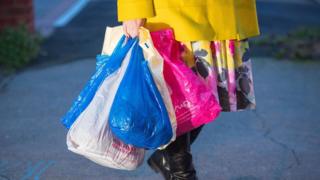 Image copyright
PA
Image copyright
PA
The fee for plastic shopping bags in England will be doubled to 10p and extended to all shops from April 2021.
Small retailers - those employing 250 people or fewer - will no longer be exempt, the Department for Environment, Food and Rural Affairs (Defra) said.
Environment Secretary George Eustice described the UK as "a world-leader in this global effort".
Greenpeace said the move was "a small step in the right direction" but urged the government to go further.
The environmental group called for "fast and substantial reductions on plastic pollution" beyond the issue of carrier bags.
Mr Eustice described the original 5p charge at large retailers as a "tremendous success" and said the increase to 10p should be seen alongside other measures such as the ban on plastic straws, drinks stirrers and cotton buds in England.
He told BBC Radio 4's Today programme he had somewhere between six and 10 bags for life at his home but did sometimes purchase carriers when he forgot them.
The increase in charge for single-use bags will encourage the sale and use of bags for life, he added.
In Scotland, Wales and Northern Ireland, all retailers - including smaller shops - already charge a minimum of 5p for plastic bags.
It was introduced first in Wales in 2011, then in Northern Ireland in 2013, before Scotland introduced the charge for all carrier bags in 2014, and England rolled out its plastic bag charge on 5 October 2015.

Media playback is unsupported on your device
A public consultation in England last year saw the "vast majority" of people back government plans to raise the fee, in a bid to further reduce the plastic used by consumers.
Since the fee was introduced in England, an estimated 15 billion bags have been taken out of circulation, with studies demonstrating the levy has had an impact on reducing plastic waste on beaches and in the sea.
In 2014, 7.6 billion bags were given away to customers at England's seven largest supermarkets, the equivalent of 140 per member of the population.
Between 2017 and 2018 just over a billion bags were sold at major supermarkets across the UK.
Smaller retailers in England supply about 3.6 billion single-use bags annually.
Last December, the Association of Convenience Stores estimated about half of the small shops it represents in England are currently charging for plastic bags.
The government "expects" retailers to donate proceeds from plastic bag sales to good causes - but it's not compulsory. According to Defra, an estimated £51m was donated in 2017-18.
But while the vast majority of retailers chose to donate their plastic bag revenue - in line with government expectations - some chose to keep the money instead.
Greenpeace welcomed the fee increase, but said plastic carriers bags were only "one part of the problem" and the government should be considering taking action on plastic bags-for-life.
Greenpeace's Sam Chetan-Welsh said: "By raising the price of plastic bags again the government is taking a small step in the right direction, but by now they should be taking great strides."
He added there were "so many ways ministers know they could be driving fast and substantial reductions on plastic pollution".
"If they're increasing costs for shoppers, ministers really have no excuse not to increase costs for the companies that are responsible for the escalating volumes of single-use plastic packaging in the first place."
Earlier this month, supermarket Morrisons initiated a trial offering paper bags instead of reusable plastic ones, with the aim of ditching all plastic bags from its stores.
Responding to the forthcoming fee hike, CPRE - the countryside charity - said it was time to "step up and face the war on plastic".
"Government should bring in charges on all single-use, throwaway items - from takeaway cups to wooden forks," said Tom Fyans, deputy chief executive.
"Incentivising re-use systems and finally committing to an all-in Deposit Return Scheme for drinks containers are the only ways the government can achieve a litter-free countryside and win the war on waste."

 5 years ago
546
5 years ago
546 

